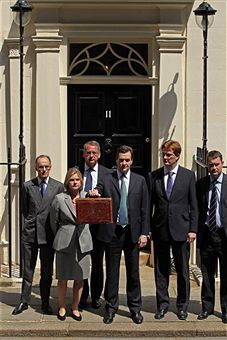 There is plenty of very good news in the Budget. A two year public sector pay
freeze, the abolition of the Child Trust Fund and cuts in welfare spending are all longstanding TPA recommendations that will be absolutely key to getting the public finances under control.
As a result of all the measures proposed, annual spending will be £31.9 billion lower than planned by 2014-15.
There is plenty of very good news in the Budget. A two year public sector pay
freeze, the abolition of the Child Trust Fund and cuts in welfare spending are all longstanding TPA recommendations that will be absolutely key to getting the public finances under control.
As a result of all the measures proposed, annual spending will be £31.9 billion lower than planned by 2014-15.
The Government are also scrapping more organisations. The Emergency Budget report says (page 31) that “Regional Development Agencies will be abolished through the Public Bodies
Bill.” We called for their abolition as far back as August 2008 and the
Spectator manifesto included a demand to get rid of them in its set of letters that David Cameron needed to send on his first day as PM. An IoD survey showed that most businesses, the very
group the RDAs are supposed to support, wanted them abolished or to see severe cuts in their budgets.
Unfortunately, spending hasn’t been cut enough and VAT has been hiked. The fiscal adjustment announced today is dominated by that one big increase in tax revenues. In the early years in
particular, the Emergency Budget doesn’t appear to get close to the purported 80:20 ratio.
The coalition have no mandate at all for a VAT hike. Tim Montgomerie on ConservativeHome has found more devastating footage of David Cameron
reassuring voters that a vote for the Conservatives would not mean a hike in VAT. Voters might be left wondering why they should bother paying attention during elections if campaign rhetoric
bears so little relation to reality on such a big issue.
The increase in VAT from 17.5 to 20 per cent means that instead of the higher income tax threshold being a welcome break for millions of families on low to middle incomes, it is just inadequate
compensation for their increased VAT burden. Chart A1 in the Budget makes it very clear that across the income distribution families are going to see a big hike in their tax bills, and Chart
A2 shows that the effect takes a similar share of their income from families across the income distribution.
As Tim Montgomerie says, and our Chief Executive Matthew Elliott has argued before, the damage from the VAT hike could be limited somewhat by setting it up as a temporary debt levy. But
really the coalition just needed to put in place more ambitious cuts in public spending. In our work, we’ve set out £50 billion of cuts in annual spending that could be made by
2011-12.
So the coalition have made a good start on getting the public finances under control. But the increases in taxation they’ve outlined will undermine their wider objectives by increasing
poverty and benefit dependency. They needed to do more to cut spending to create the conditions for lower taxes now and sustainable public finances to allow even lower taxes in the future.
Matthew Sinclair is Research Director at The Taxpayers’ Alliance
Matthew Sinclair
Why must VAT rise? Because not enough will be cut






Comments